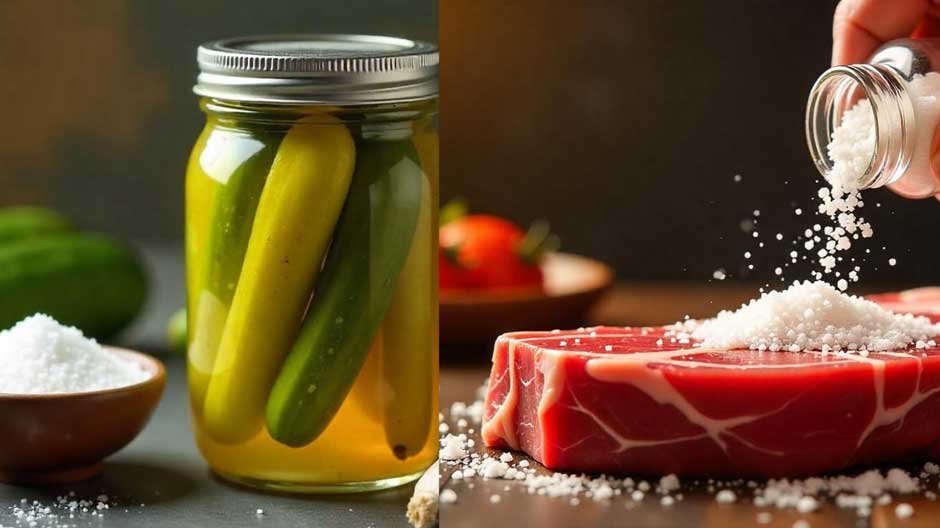You’ve probably looked at a recipe and stopped when it said, “Use pickling salt” or “kosher salt.” You might think, Isn’t all salt the same? It’s not. Even though both look like regular salt, they work differently in cooking.
And if you use the wrong one, it might change how your food turns out. That’s why it helps to understand the difference between them.
So today, this blog will walk through pickling salt vs kosher salt simply. First, we’ll see what each salt is. Then we’ll look at how they’re different, what they’re best for, and if you can swap one for the other. So, let’s begin with the basics.
What is Pickling Salt?
Let’s start with pickling salt. As the name suggests, people use it for pickling. It’s very fine and smooth, which helps it mix fast in water or vinegar. It doesn’t have any added ingredients like iodine and no anti-clumping powder.
That is why your pickle brine remains clear and clean. This type of salt is also known as canning salt. If you want your pickles to look fresh and taste delicious, this salt works well. Many home cooks keep it just for that reason.
From kitchen to wellness, Ittefaq Salt – a manufacturer of Himalayan salt has got you covered.
What is Kosher Salt?
Now let’s talk about kosher salt. This salt has large, rough flakes. It got its name because butchers used it to take blood out of meat during the koshering process. Today, it’s popular in everyday cooking too. People use it to season meat, flavor pasta water, or sprinkle it on fries. The big flakes are easy to grab and spread. It sticks well to food and gives a sharp, salty taste.
FACT:
Some brands add powder to stop clumping, so it is smart to check the label if you want to use it in pickling.
Key Differences Between Pickling Salt & Kosher Salt
No, let’s talk about the main things that make these salts different. This part will help you choose better when cooking.
1. Grain Size & Texture
Pickling salt is fine and smooth, while kosher salt has coarse and flaky grains. This makes pickling salt better for liquid use, while kosher salt is better for rubbing on meat or seasoning.
2. Additives
Pickling salt is just pure salt with no added ingredients. However, kosher salt is usually clean too, but sometimes brands may add a powder to stop clumping. That’s why it’s always safe to check the label.
3. Use In Recipes
Pickling salt melts quickly and gives a clear brine since it is great for making pickles. Kosher salt is perfect for dry brining meat. The big flakes pull water from the meat and add flavor deep inside.
4. Pickling Salt Benefits
- Melts fast in vinegar or water
- Gives a clean, clear brine
- Has no iodine or powder that can change flavor or color
5. Kosher Salt Benefits
- Works well for seasoning meats
- Easy to grab and spread by hand
- Gives a strong, bold flavor
- Flakes stick nicely to food
So the choice depends on what you’re cooking and what kind of result you want.
Can You Substitute Pickling Salt For Kosher Salt?
This is a common question and the answer is yes! but only in some cases like if you are making pickles and don’t have pickling salt, you can use kosher salt but only if the kosher salt has no anti caking powder in it because that powder can make your brine cloudy so always check the label first.
Also, kosher salt is less dense than pickling salt. That means if a recipe asks for one spoonful of pickling salt, you’ll need a bit more kosher salt to get the same level of saltiness.
However, can you use pickling salt in place of kosher salt? Not really. Pickling salt is too fine. If you try to dry-brine meat with it, it won’t pull out the moisture the same way. So, in that case, kosher salt is the better choice.
Pickling Salt Vs. Kosher Salt: Which One Should You Use?
So now here comes the main question: what salt should you use? The answer is simple. If you’re making pickles or working with vinegar, then go with pickling salt. It melts fast, looks clean, and won’t change your brine.
If you’re seasoning meat, cooking pasta, or just adding salt on top of food, then kosher salt is the better pick. Its flakes are easier to handle and give food a stronger salty touch.
Also, always check your salt pack. Even a small amount of added powder can mess up the result. If you want to keep it safe and clean, Ittefaq Salt has some of the best pure options out there for both types.
Conclusion:
So let’s go over it one more time. In this simple blog on pickling salt vs kosher salt, we saw how each one works in different ways. Pickling salt is best for clear, smooth brine and fast dissolving. Kosher salt is best when you want a strong flavor and easy control while seasoning.
You can swap one for the other, but only if you know what’s inside and adjust the amount. Picking the right salt is a small step, but it makes a big difference.
Now you know what to use and when, and your cooking will turn out just right.










